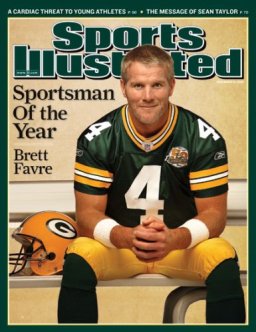 This whole “Brett Favre as Sportman of the Year” in Sports Illustrated is getting some interesting responses. Some folks out there stumped for Tony Dungy (and so did Mike Greenberg on ESPN yesterday), saying his accomplishment of being the first black coach to win the Super Bowl (along with his personal struggles and efforts to help others) should have nabbed him the award, and slammed SI hard in the process. Others have hilariously chalked it up to Favre being a sports media darling. I can’t argue with the rationale for Dungy, and he probably got robbed in the same way Roger Federer got jacked when Dwyane Wade won the honor last year.
This whole “Brett Favre as Sportman of the Year” in Sports Illustrated is getting some interesting responses. Some folks out there stumped for Tony Dungy (and so did Mike Greenberg on ESPN yesterday), saying his accomplishment of being the first black coach to win the Super Bowl (along with his personal struggles and efforts to help others) should have nabbed him the award, and slammed SI hard in the process. Others have hilariously chalked it up to Favre being a sports media darling. I can’t argue with the rationale for Dungy, and he probably got robbed in the same way Roger Federer got jacked when Dwyane Wade won the honor last year.
Then again, we are presuming that the ultimate decision in the SI offices is completely independent of the need to sell some copies. That’s rarely the case, even when the decision is completely unconscious. If you look at it in the context of what moves the newsstand business, Favre is a logical choice — and while he has done plenty of good this year and over his career to make candidacy plausible, I sense much of this has to do with how popular he is among the football and cultural populace as well as whatever accomplishments he has had at an age where many NFL players have retired.
I’m sure SI’s editorial staff says it picked Favre independent of any such sales concerns, but in every pitch meeting, no matter what form of media, one of the concerns is always, when doing a feature story, is: “What would people like to read or watch?” Dungy’s story doesn’t always jump out at you because of his somewhat retiring personality. He has a best-selling book to his credit, but his base of support isn’t what Favre has built up over the years.
Players move units, get eyeballs popping, get people reading more often than not. A cursory look at a Wikipedia list of SOY winners notes that Bill Russell, Joe Paterno, Don Shula, and Dean Smith are the only coaches that have won the award. Russell was still playing at the time. Paterno and Smith are from the college ranks, where the ultimate identifiable faces are those coaches who define their programs. Shula, as an old-school coach, was much more “out there” with a larger fan base, and had the all-time winningest NFL coach mantle. Dungy is more reserved and humble — while it’s an inspirational story, it’s not one that will drive cursory readers to pick up copies off the stand.
Sportsman of the Year is about as useful a barometer now of who exemplifies achievement, sportsmanship, etc. over the past year as Time’s Person of the Year is in the news now (the concept of “You” in the wake of digital media was a complete cop-out, facilitated more by what I’m sure its design department thought was ingenious — putting a mirror on the cover.) It’s nice, it looks good, it gets a person on the cover, but I’m not so sure that it really tells a lot about who exemplifies the values SI puts out there than it tells us whom the sports media is enchanted with at any given point and time.
Filed under: journalism, NFL, sportswriters | Tagged: apple polishing, awards no one cares about, Brett Favre, moving units, Sports Illustrated, Sportsman of the Year | 5 Comments »

